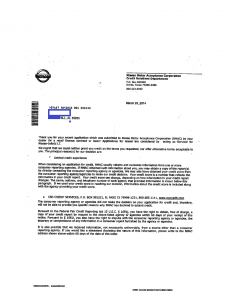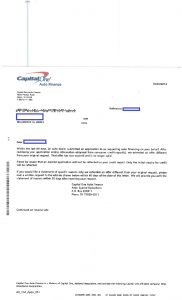Whenever you Apply for Credit or any sort of Installment Loan, you are supposed to receive a written notice from the creditor telling you if you were approved, denied, or given a counter-offer. This is more important than you think. Here’s why.
There’s this thing called the Adverse Action Notice. It’s a letter that anyone who receives a consumer credit application must send to the applicant if they do anything but approve their application on the terms requested. Here’s what they look like:


Both the Equal Credit Opportunity Act (ECOA) and the Fair Credit Reporting Act require adverse action notices, but the same letter can serve both purposes, and the ECOA requirements are more important.
Just like the name says, the Equal Credit Opportunity Act was originally intended to prevent credit discrimination by forcing creditors to tell people the real reason why they were denied a loan or offered a 12% interest rate when everybody else got a 7% interest rate. It’s really hard to discriminate against divorcees or blacks if you’re not allowed to just deny without an explanation. It still does this, though I like to think that our society has progressed beyond the point of people being mistreated solely because of their color, sex, religion, or whatever.
But the Adverse Action Notice has two very important functions that Congress probably didn’t foresee back in 1974.
1. It alerts you to problems with your credit report. Because the adverse action notice has to tell you why you were denied, (i.e. “You have too much debt already.”), it can alert you to credit problems that you didn’t know you had. For instance, if you get a denial letter that says your auto loan application was denied because you had “Too many recent inquiries,” and you know for a fact that you haven’t applied for any sort of credit in 2 years, then you know that something is wrong, and you’ve been alerted to a possible identity theft issue that you need to take care of ASAP.
2. It warns you of fraud by potential creditors and salespeople. This happens most often in the context of auto sales, but it can just as easily happen with mortgage lending (where there are much bigger consequences). How? I’ll use an example to show you why. You go to a car dealer shopping for a car. You pick one or two models you’re interested in and you offer a $3,000 down payment and you ask to finance the remaining $18,000 at 8% APR over 48 months. You fill out a credit application and you hand it to the dealer. He uploads it to his computer system and submits the loan to potential finance companies.
What’s supposed to happen next is this: he sends your application to a four potential lenders, and they respond. Whichever one gives you the best deal gets the contract. You get the car. The dealer sells a car. The finance company gets a new customer paying them 8% APR for their loan.
But what can (and sometimes does) happen is this: three lenders reply, two of them offer you financing at 9%, and the other offers you financing at 12%, but is willing to finance a bunch of junk charges like a $1800 service contract that cost the dealer $600 and pay the dealer a bonus $500 for sending you their way. The dealer then tells you that you’ve been approved for 12%, and that’s all they can do. You believe him and you take the deal.
30 days later, you get two letters from finance companies you never heard of, announcing that they got your applications, but only offered you 9%, and that they haven’t heard from you since then. You think WTH? I signed up for 12% when I could have gotten 9%? So now you know you’ve been screwed. That’s what is supposed to happen. Now you can do something about it. Like calling a lawyer in Alabama who can help you take action to defend your rights.
Leave a Reply